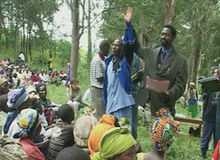Gacaca, Living Together Again In Rwanda?
| Gacaca, Living Together Again In Rwanda? | |
|---|---|
 Screenshot depicting a Rwandan man testifying before a Gacaca court. | |
| Directed by | Anne Aghion |
| Produced by |
Philip Brooks Laurent Bocahut Anne Aghion |
| Edited by | Nadia Ben Rachid |
| Distributed by | Dominant 7, Gacaca Productions, and Planète |
Release dates | 2002 |
Running time | 55 min. |
| Country | Rwanda |
| Language | Kinyarwanda with English subtitles |
Gacaca, Living Together Again In Rwanda? is the first documentary film in a trilogy by Anne Aghion examining the aftermath of the Rwandan Genocide. Directed by Anne Aghion and produced by Dominant 7, Gacaca Productions, and Planète, this 2002 film won UNESCO's Fellini Prize.[1][2] Filmed in Rwanda, the language of Gacaca is Kinyarwanda with English subtitles.[3] In Kinyarwanda, gacaca means "grass", which was the location of the reparation trials in Rwanda.[4]
Plot
The first film in this award-winning trilogy ventures into the rural heart of the African nation of Rwanda. Follow the first steps in one of the world’s boldest experiments in reconciliation: the Gacaca (Ga-CHA-cha) Tribunals. These are a new form of citizen-based justice aimed at unifying this country of 8 million people after the 1994 genocide which claimed over 800,000 lives in 100 days. While world attention is focused on the unfolding procedures, award-winning documentarian Anne Aghion bypasses the usual interviews with politicians and international aid workers, skips the statistics, and goes directly to the emotional core of the story, talking one-on-one with survivors and accused killers alike. In this powerful, compassionate and insightful film, with almost no narration, and using only original footage, she captures first-hand how ordinary people struggle to find a future after cataclysm.
References
- ↑ "In Rwanda We Say…The Family That Does Not Speak Dies". UNAFF. 2004. Retrieved 2008-07-30.
- ↑ "Gacaca, Living Together Again in Rwanda?". Prevent Genocide International. 2005-09-21. Retrieved 2008-07-30.
- ↑ "The 2003 Human Rights Watch International Film Festival". Human Rights Watch. 2003. Retrieved 2008-07-30.
- ↑ Ramsey, Nancy (2003-04-24). "Filming Rwandans' Efforts To Heal". The New York Times. Retrieved 2008-07-30.